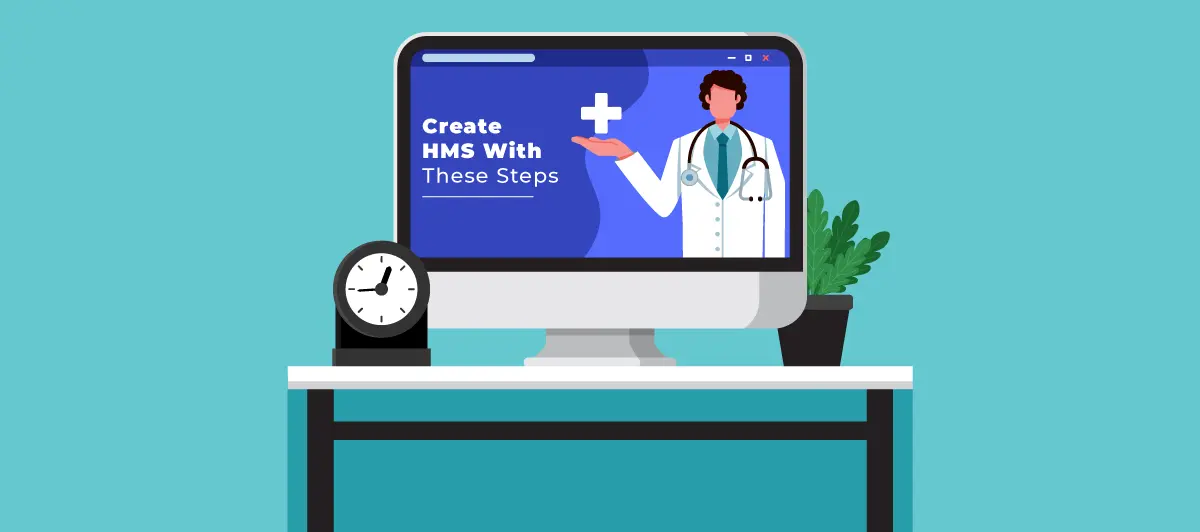How To Create Hospital Management Software: Step-By-Step Guide
Quick Summary: If you are running a hospital, you can understand how difficult it is to maintain and manage day-to-day activities or daily operations and huge data of patients. Thus, You need hospital management software. But it isn’t a cup of tea for everyone. So, the question is how to create a hospital management software? Well, this is what we will tell you in this blog. Keep reading!
Introduction
Creating a Hospital Management Software is complex yet important in today’s healthcare landscape. This software plays a pivotal role in streamlining administrative claims management tasks, and payroll management, enhancing patient care, and ensuring the efficient functioning of medical facilities. In this step-by-step guide, we’ll break down the process into manageable chunks, making it accessible even if you’re not a tech guru.
Hospital patient Management Software simplifies various hospital tasks, including patient registration, appointment scheduling, billing, and other electronic medical record and management. It’s a powerful tool that can improve the overall healthcare experience for both patients and healthcare providers.
So, let’s start on this extremely interesting topic: How to create the best hospital management software ever? And if you need more help then, approach a hospital management software companies!
But Now keep reading this!
What Is Hospital Management Software?
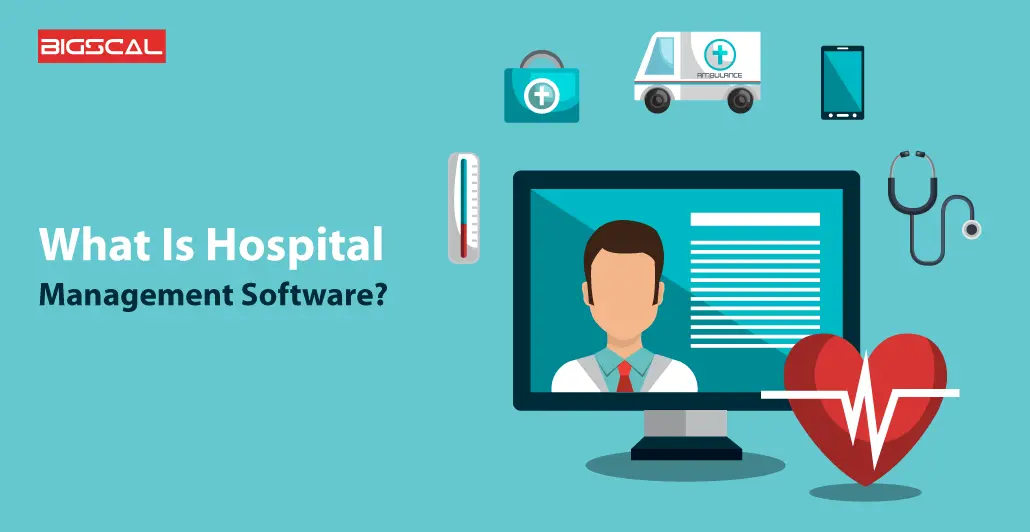
Before knowing the How to create hospital management software, first understand the meaning of HMS let us explain hospital management software.
So, Hospital management system or hospital software tool is like a digital helper for hospitals or the healthcare industry. It’s computer software that helps hospitals and clinics keep track of patient records, appointments, medicines, and more.
In addition, it makes managing a hospital’s day-to-day tasks easier and more organized. Doctors and staff can use it to schedule appointments, update patient information, and even handle billing and payments. Basically, it’s a tool that helps healthcare centres to run smoothly and take better care of patients.
Some Common Features Of Hospital Management Software
Now, let’s have a look at the features of Hospital management system:
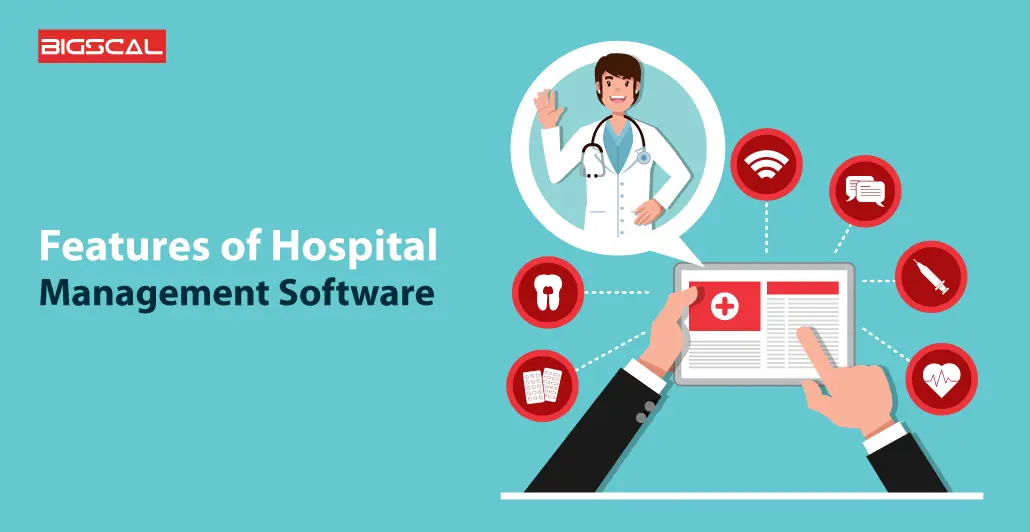
- Patient Registration
- Appointment Scheduling
- Electronic Health Records (EHR)
- Billing and Invoicing
- Inventory Management
- Pharmacy Management
- Laboratory Management
- Radiology Information System (RIS)
- Financial Management
- Staff and Resource Management
- Electronic Prescriptions
- Telemedicine Integration
- Reporting and Analytics
- Security and Compliance
- Patient Portal
- Mobile Accessibility
- Alerts and Reminders
- Emergency Management
- Insurance Verification
- Integration with Medical Devices
- Emergency Management
The Must Have Features That You Should Include In HMS
Must Have For Doctors and Hospital Staff
Hospital management software should have several key features to support doctors and staff effectively. Some of these must-have features include:
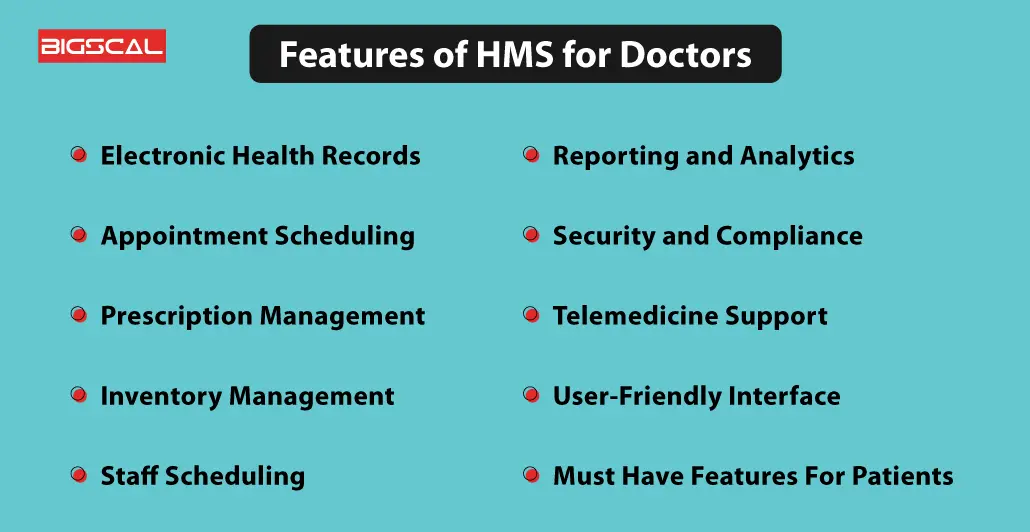
Patient’s Records Management And Electronic Health Records (EHR)
A good HMS should prioritize efficient patient data management. This feature ensures that doctors and hospital staff can access crucial patient information swiftly, enhancing the quality of care and reducing errors.
EHRs digitize patient data, making it easily accessible, secure, and shareable among all authorized users and healthcare providers. This enhances collaboration, minimizes paperwork, and improves patient care.
Appointment Scheduling And Billing and Invoicing
Effective appointment scheduling is important for a seamless healthcare system. It helps doctors manage their time effectively, reduces patient wait times, and enhances overall patient satisfaction.
Efficient billing and invoicing processes are essential for healthcare facilities. This feature simplifies financial transactions, reduces billing errors, and ensures a steady revenue stream behavioural health centres.
Prescription Management And Laboratory and Test Results Integration
An effective HMS must include prescription management to enable doctors to prescribe medications electronically, improving accuracy and reducing prescription-related errors.
Seamless integration with laboratory systems facilitates quick access to test results. This expedites diagnosis and treatment decisions, leading to better patient outcomes.
Inventory Management
Hospitals deal with a wide range of medical supplies. Robust inventory management ensures that essential supplies are always available, reducing disruptions in patient treatment.
Staff Scheduling And Patient Portals
Efficient staff scheduling is necessary to ensure quality control and that hospitals are adequately staffed at all times. This feature helps optimize work shifts, minimize burnout, and maintain quality treatment.
A patient portal allows doctors to access their patient’s electronic medical records, schedule appointments online, and communicate with their healthcare providers securely. This not only enhances patient engagement but also reduces administrative burdens on healthcare professionals, ensuring smooth operations.
Reporting and Analytics
Effective reporting and analytics tools are vital for doctors and hospital staff. They provide actionable insights into patient data, helping medical professionals make informed decisions, improve patient outcomes, and streamline resource allocation.
Security and Compliance And Mobile Accessibility
In the healthcare industry, data security and regulatory compliance are paramount. A HMS must offer top-notch clinical data security measures to protect sensitive patient information and ensure adherence to strict healthcare regulations, like HIPAA.
Accessibility via mobile apps and mobile devices is essential for healthcare providers who are constantly on the move. A mobile-friendly HMS allows doctors and staff to access patient data and perform tasks from anywhere, ensuring uninterrupted patient’s care.
Telemedicine Support
The rise of telemedicine demands that a HMS includes telemedicine support. It enables doctors to conduct virtual consultations, expanding their reach and providing patients with convenient access to healthcare services.
User-Friendly Interface, Support and Training And Customization
A user-friendly interface is a must. Doctors and hospital staff need an intuitive system that doesn’t require extensive training, allowing them to focus on patient’s care instead of grappling with complex hospital software itself.
Ongoing support and training are important. A comprehensive HMS should provide adequate training resources and responsive customer support to assist medical professionals in using the system effectively.
In every healthcare institution, the diversity is unique, and a tailored HMS can easily accommodate this diversity. It permits the doctors and hospitals to customize the system to their own requirements, making it precise for their own work.
Read more: How Patient Relationship Management Software Helping The Healthcare Sector
Must Have Features For Patients
Hospital administration software should as well as offer essential things that will improve the patients’ experience and interaction. Here are some must-have features for patients in hospital management software:
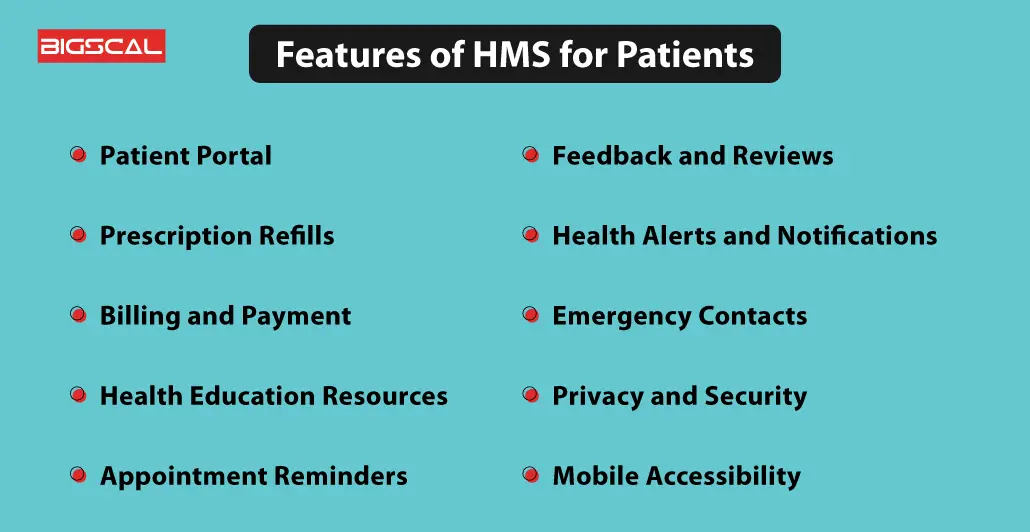
Patient Portal And Online Appointment Scheduling
Portal is the doorway to a no-problem healthcare attainment. It enables the patients to reach their medical history, examine the test outcomes, and converse with the healthcare providers. Such a facility encourages transparency and patient engagement, and in the end, it results in better health outcomes and patient satisfaction.
People undoubtedly value the convenience of healthcare. One of the main advantages of online appointment scheduling is that patients can schedule their appointments at their own time, thus decreasing the waiting time and making sure that all the patients are able to access the health care. This feature improves the patient experience and at the same time it makes a healthcare resource utilization more efficient.
Access to Medical Records And Prescription Refills
The easy availability of health records to patients makes them more aware of their own medical path. It enhances the accountability, aids in the decision-making, and lets the patients to convey their medical history to other healthcare professionals in case of emergency.
The refill function simplifies the medication management by giving the patient the possibility to call the doctor to ask for a refill of the medication. Patients can ask for refills of their medicines online, thus, lowering the administrative work and making sure that the patient get their medicines on time, this, in turn, increases the patient’s adherence to the medicines.
Billing and Payment And Secure Messaging
The most effective way to describe the convenience of clear and easy billing and payment is that they make the financial aspect of healthcare hassle-free. Patients like to know the healthcare costs in advance, it can cut their stress and make the payment process more effective.
The secure messaging will provide the patients with private and efficient communication with the healthcare professionals. It facilitates patients to raise queries, get guidance, and get answers in a timely manner without affecting data protection.
Telehealth Services And Health Education Resources
In a t globalizing world, telehealth services are becoming a must. This feature provides the patients with the chance to have a remote consultation, thus, remote consultation is a way of offering more access to the care, mainly for the people who have the problems with the mobility or distance.
The provision of health education resources to the patients cultivates their readiness to take their own care. The informative articles, videos, and resources play a significant role in empowering patients to make informed decisions about their health.
Appointment Reminders And Check-In and Registration
The sensors can prevent you from being late to appointments or missing classes by sending you the automated reminders via text or email. Patients are served well by the timely notifications which, in turn, boost their compliance with their appointment and treatment schedules.
Patients’ experiences with the coming in and registration get easier and more simple. This is the time-saving aspect which relieves the administrative burden and hence the appointments are made more efficiently. Patients like the fact that they can be seen by the doctor without wasting their time and they will have a good feeling towards your healthcare facility.
Feedback and Reviews
The requirement of a feedback and review system in the Healthcare Management System (HMS) cannot be overemphasized. This way it makes the patients participate, so they can tell you what they want, and this may lead you to improve your services. Positive reviews can be a magnet for new patients, while negative ones are a chance for improvement and thus present the path to excellent service.
Health Alerts and Notifications
Patients should be kept informed of their appointments, medication and health updates which are the important things to be considered. Health alerts and notices keep the patients informed about their own health, thus assisting them in the task of following their healthcare, which is a sure way of achieving the desired compliance and the general well-being.
Emergency Contacts
Safety is important. Introduce an emergency contacts feature in your HMS so as to enable patients to easily transfer the essential information to healthcare providers in case of emergencies. This is the indication of your dedication to the patient safety and their ignorance to their fear.
Privacy and Security
The protection of patient data is indefinitely the top priority. Be careful of the privacy and security of the electronic health record information and make sure that it is being protected well. This not only protects the society from legal issues but also creates the confidence of the patients.
Mobile Accessibility And Language Preferences
The smartphones are now almost everywhere, so the mobile accessibility to medical data is the most necessary thing. The application or mobile-friendly interface of patients allows them to access their health information, schedule the appointments, and get the alerts on-the-go, thus they improve their healthcare experience.
In our diversified world, language should never be a hindrance to healthcare access to a person. Through the provision of language options in your HMS, you are actually making your scheme of patient care sensitive to the people with the language limitations and you are ensuring that everyone can freely and comfortably talk with the health care professionals.
Virtual Waiting Room
The problem of physical waiting rooms is removed by a virtual substitution. Patients can no longer wait for appointments in person, hence, patients can now be seen remotely. Thus relieving them from stress and cutting down on their possible exposure to contagious diseases. The introduction of this creative aspect improves patient satisfaction and safety.
Benefits Of Creating Hospital Management Systems
Have you understood what is HMIS software? Now read about it’s benefits:
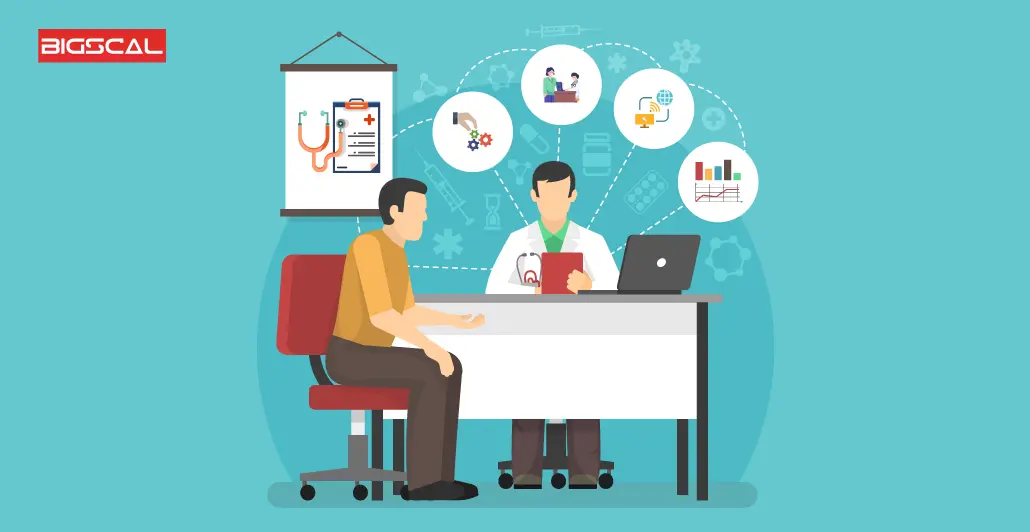
Efficient Patient Care
A Hospital Management System allows the patient treatment to be optimized by digitizing the patient records which then can be easily accessed by the doctors and the nurses. This approves the possibility of speedy diagnosis, treatment, and medication management, which in the end brings better patient outcomes and less waiting time.
Improved Record Keeping
Digital patient record management in-keeping of paper files and the minimization of the risks of errors, in turn, makes the process more efficient and accurate. This protects the patient data from being inaccurate, insecure, and impossible to get when it is needed, and thus, it facilitates the preparation of better treatment plans and the coordination among the healthcare staff.
Enhanced Communication
The Hospital Management System helps in the seamless transfer of information between the healthcare professionals. Doctors, nurses and administrators can exchange important data quickly, thus, they can make the decisions faster and they can easily coordinate their care for the patients.
Resource Optimization
These systems allow hospitals to use their resources like staff, equipment and beds in a better way. Through the study of the data on the admission and discharge of patients, the hospitals are able to distribute the resources more effectively, thus, the waiting time is reduced and the financial loss is minimized.
Billing and Financial Data management
Hospital Management System streamlines billing processes, hence, the mistakes are avoided and the reimbursement is accelerated. Such an application is the guarantee that hospitals get paid on time, which in turn helps them to keep their finances stable and offer the best care.
Data Analytics
Software for hospitals assist in the gathering and analysis of data about patients, treatments outcomes, and utilization of resources. Therefore, this data handling strategy for data makes doctors to be able to make correct decisions. Moreover, it also boosts patient satisfaction and makes hospital tasks or activities run smoothly.
Patient Engagement
This is the reason why hospital management system has built-in features like online appointment booking, electronic medical records, and telemedicine that encourage patient engagement. Patients are able to talk to doctors easily because of the technology. Thus, it, in turn, enlightens communication and thus, overall satisfaction is also increased.
Security And Compliance
HMS is working on the data of a patient security through encryption and access controls. It likewise assists hospitals in following regulatory norms such as HIPA. It keeps the patient’s privacy and stays away from the legal problems.
Inventory Control Management
The HMS takes care of inventory management and it is done in an efficient way. Thus, it cuts down the garbage and hospitals get the required medical equipment and supplies. Thus, the result of this is the reduction of the hospital management software price in India and the care of the patients.
Remote Access
The hospital staff can get patient files and manage the tasks from the remotely. It speeds up the process and thus makes it possible to give quicker response to emergencies and patients needs.
Scalability
With the growth of hospitals, the software can be expanded to include an even larger patient load. Its capacity to manage the excess of the service load is huge. Thus, all these are the reasons that prove the usefulness of the healthcare management software in the long run.
Types Of Hospital Management Software
Read all these types, and select the most suitable type of Hospital management System.
Electronic Health Records EHR
E-Health Records are the digital copies of a patient’s medical history, treatments and test results. They assist physicians and healthcare professionals in acquiring and modifying patient data easily. EHRs create better patient care by cutting down on paperwork, facilitating the transmission of data, and making the medical records more accurate.
Hospital Information Systems
Hospital Information Systems are the sophisticated software systems that handle all the different hospital activities like patient’s registration, billing, inventory, and scheduling. They are the ones who have streamlined many administrative system tasks, improved the efficiency, and are in a position to make the best decisions at the management of the hospital
Practice Management Software
The so called Practice Management Software helps medical practices in the area of appointments, billing, and administrative tasks. It assists healthcare providers in the planning of their practice, lessening of the paperwork, and in the improvement of the patient’s interactions.
Laboratory Information Systems LIS
Laboratory Information Systems deal with and automate the laboratory tasks in medical laboratories. They are responsible for the management of test orders, sample processing, and the reporting of results, which in turn, guarantees the accuracy and the efficiency of the laboratory operations.
Radiology Information System
Radiology Information Systems are meant for use in radiology departments. They are in charge of patient’s data, radiology exams, and imaging equipment scheduling, this way they ensure that the radiology services are done on time and are accurate.
Picture Archiving and Communication Systems
PACS software stores and retrieves medical images like X-rays and MRIs digitally. It enables healthcare professionals to view, share, and store medical images efficiently, improving diagnosis and treatment.
Pharmacy Management Systems
Pharmacy management software helps health facilities efficiently handle medication-related tasks. It tracks drug inventory, manages prescriptions, and ensures safe dispensing to patients, reducing errors and improving patient safety.
Patient Engagement and Portal Solutions
These systems empower patients to engage in their healthcare. They offer online portals where patients can access medical records, schedule appointments, and communicate with healthcare professionals, enhancing patient-provider communication and convenience.
Revenue Cycle Management (RCM) Software
Revenue Cycle Management software streamlines the financial aspects of healthcare, from billing to insurance claims. It helps hospitals optimize revenue by ensuring accurate billing and efficient payment processing.
Nursing Information Systems (NIS)
NIS software assists nurses in managing patient’s data, care plans, and workflows, ultimately improving patient care coordination and nursing efficiency.
Telemedicine and Telehealth Platforms
Telemedicine and telehealth software enable remote medical consultations, laboratory tests and monitoring, enhancing access to healthcare services and allowing patients to receive care from the comfort of their homes.
Healthcare Analytics and Business Intelligence
These tools analyse healthcare data to provide insights for better decision-making. Hospitals use them to improve operational efficiency, patient outcomes, physician management, and cost management.
Health Information Exchange (HIE) Platforms
HIE platforms facilitate the secure exchange of patient information among healthcare providers, ensuring that crucial medical data is accessible when needed, promoting coordinated care.
Clinical Decision Support Systems (CDSS)
CDSS software assists healthcare professionals by providing evidence-based guidance at the point of care. It aids in diagnosing and treating patients by offering recommendations and alerts based on medical knowledge and patient’s data.
Hospital Contract Management Software
Hospital contract management software streamlines contract processes, automates approvals, and enhances compliance. It simplifies contract creation, tracking, and reporting, improving efficiency and reducing errors. Users can easily access contract details, deadlines, and revisions, ensuring transparency. The software also alerts stakeholders about critical dates and obligations. It facilitates collaboration among teams, enabling faster decision-making. Additionally, it integrates with other hospital systems, enhancing data accuracy.
How To Create A Hospital Management Software
So, here we are presenting the steps and understand how to create website for hospital management system Read them with your focus to get the answer of your question (how to create hospital management Software) and apply each step when you start when you start working for development of HSM.
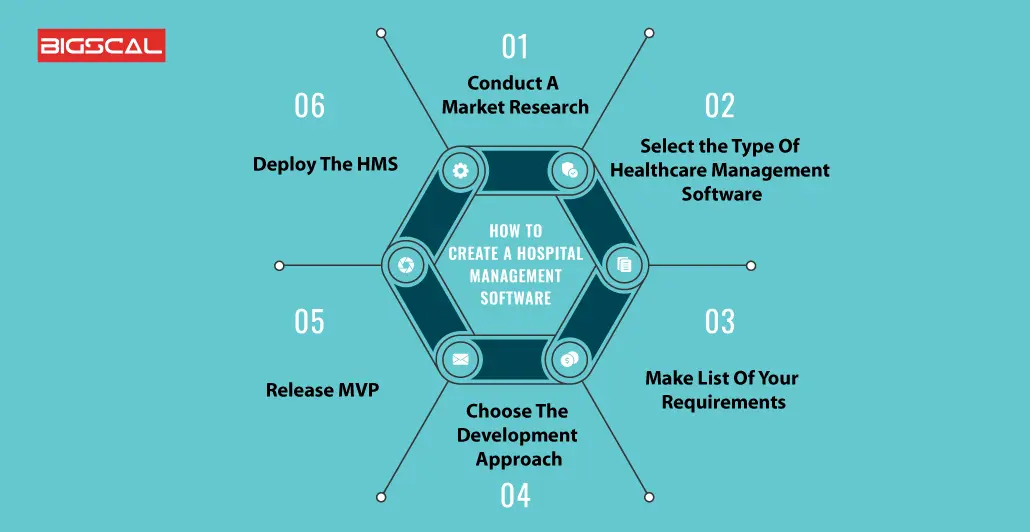
Conduct A Market Research
To create a hospital management software, the very first step you should follow is conducting market research. It means you need to gather information about your competitors and hospitals who use HMS. Find out what types of hospital management software are already available and what features they offer. Understand the needs and challenges they face. Talk to potential users to get insights into what they require from such software.
This research helps you identify gaps in the market that your software can fill and ensures you’re creating a product that meets real-world needs. It also helps in setting the right pricing strategy and marketing approach.
Select the Type Of Healthcare Management Software
After a market research, you’ll need to decide on the type of healthcare management software you want to create. This could be EHR software, Patient Billing and Scheduling software, or even special software for a specific medical department. Your choice should align with your research findings and your team’s expertise.
For example, if you find that there’s a demand for user-friendly EHR systems, you might focus on that. Keep in mind that different types of software will have different functionalities and user requirements, so choose wisely to meet the specific needs of your target users.
Make List Of Your Requirements And Must Have Features
Before creating a Hospital Management Software, it’s crucial to list your requirements and must-have features. This means making a plan of what the software needs to do. Consider aspects like patient management, appointment scheduling, billing, inventory, and report generation
Also, think about user roles and permissions for doctors, nurses, and administrative staff. Your list should be comprehensive to ensure the software meets the needs of the hospital efficiently.
Choose The Development Approach
It is very necessary to choose the development approach. You can opt for two main approaches: custom development or using existing software (like EMR or EHR systems). Custom development allows you to create a custom solution that relates to your hospital’s needs but may take more time and resources. Using existing software can be quicker, but it has less chances that it will fulfill all requirements. Ensure that you choose an approach that aligns to your budget and timeline.
Additionally, consider scalability and long-term maintenance to keep your software up-to-date and efficient as your hospital grows.-
Release MVP
Developing HMS can be a complex and time-consuming endeavor. To start quickly and gather user feedback, it’s good to release a minimum viable product (MVP). An MVP is a simple version of your HMS that includes only the most essential features.
By focusing on core functionalities such as patient registration, appointment scheduling, and billing you can launch the MVP faster. This allows you to gather insights from real users and it helps you to make a specific decision about further development.
Once the MVP is live, continuously gather feedback, identify pain points, and refine your software on the basis of user input. This iterative approach ensures that your HMS evolves to meet your needs effectively.
Deploy The HMS
After developing and refining your hospital management software, It’s time to deploy it in a hospital setting. Deployment involves several steps to ensure a smooth transition from the existing healthcare systems, to your new HMS.
Firstly, prepare the hospital’s infrastructure, including hardware and network requirements, to support the software. Then, perform thorough testing to identify and resolve any bugs or issues. Train the hospital staff on how to use the HMS. Provide them a comprehensive hospital management software guide and documentation.
Once everything is in order, begin the deployment process in stages. Start with a small group of users to minimize disruptions. Monitor the system closely during the initial days to address any issues. As HMS becomes stable, expand its usage across the entire hospital.
How Bigscal Can Help You In Developing Hospital Management Software?
To be honest, if you are not sure how to create the hospital management software then we are all ready to serve you. One of the top hospital management software development companies in India. So, we can help you in developing hospital management software by using our knowledge in the HMS development.
We can create an intuitive interface, add the features of patient data, appointment scheduling, and billing, etc., and thus, we can design a true user-friendly interface. Besides, the experience guarantees that the software meets the required standards and is also safe. Thus, why give up the chance to boost your hospital activities and to enhance patient treatment through the use of efficient software solutions by selecting us.
Conclusion
Thus, at the end of our guide, we expect everyone to be able to answer the question about how to create hospital management software! Nevertheless, this procedure is a slight difficult to follow but it’s worth it to follow and create the HMS. The second reason why you should daydream about having our help is that, as you just read, you can easily contact us if you need to create a hospital management system. So, now analyze about how much does it cost to make a hospital?
FAQ
1
What are the top hospital management companies?’ tags=” custom_id=” av_uid=’av-lkb65wvj’ sc_version=’1.0′]
The three most successful hospital management companies in the United States are HCA healthcare, Tenet Healthcare, and Universal Health Services. These companies are the one who manage and operates many hospitals and healthcare facilities around the nation.
Which software system is used in hospitals?
Hospital management, also known as healthcare administration or healthcare management, deals with the organization, coordination, and administration of different parts of a hospital or healthcare facilities. The work of a healthcare leader covers many fields of life, such as personnel management, financial resources, the care of the patient, infrastructure, and the compliance with the law to ensure the efficiency and effectiveness of the healthcare delivery.
What is hospital management called?
A lot of hospitals in the United States today are using Electronic Health Record (EHR) systems. There are so many EHR systems out there that some of the most popular ones are Epic, Cerner, and Allscripts. They are the key factors in hospital management of patients’ data, treatment plans, and they also simplify the healthcare operations. Take into account that software choices might be different depending on the region and the healthcare institution.
What software system do most hospitals and medical institutions use?
A lot of hospitals in the United States today are using Electronic Health Record (EHR) systems. There are so many EHR systems out there that some of the most popular ones are Epic, Cerner, and Allscripts. They are the key factors in hospital management of patients’ data, treatment plans, and they also simplify the healthcare operations. Take into account that software choices might be different depending on the region and the healthcare institution.
What are PM systems in healthcare?
PM (Practice Management) systems in healthcare are software programs that help a medical practice to manage their administrative and financial tasks more efficiently. They’re involved in the appointments scheduling, billing, insurance claims processing, and the records of the patient’s management. The PM systems enable the healthcare providers to administer their practices easier, cut the paperwork, and guarantee the right billing and reimbursement processes.
